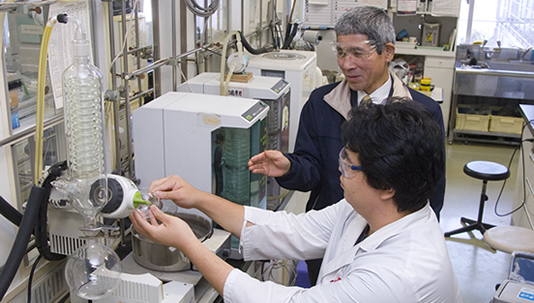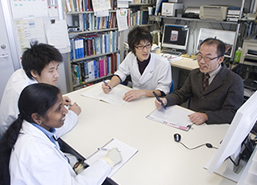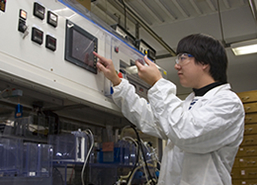Curriculum

Purpose of education
The field of applied chemistry is vast and is progressing rapidly, directlyconnected with society. In order to respond to the demands of society for the creation and development of new substance required by the society,appropriate planning to enhance the efficiency of students' study is necessary. Also, students need to receive intensive high standard specialized education to gain sufficient fundamental scholastic ability and the ability to materialize practical applications in the field in which the students will enter in the future. To respond to these requirements, the university established courses that are available to students who entered in the academic year of 1993 and after. The objective of education is to educate students for the good engineers having new ideas and rich imagination.
Outline and features of curriculum
The most distinctive features of the department's curriculum are the courses we established, which are available to students who entered in the academic year of 1993 and after. The courses are Resources, Energy and the Environment, Structural and Functional Materials and Biomolecules. There are altogether thirteen research groups in these three courses. Fundamental studies change very little regardless of how fast studies progress. Students study the following compulsory subjects: physical chemistry, inorganic chemistry, organic chemistry, analytical chemistry, seminars and experiments and Reading I (English for chemistry). In addition to the core studies,students also study optional compulsory subjects, optional subjects (special basic subjects and special applied chemistry subjects) and other associated subjects, apart from studies of courses.
Students are divided into courses in their third year. Students study twospecial basic subjects and subjects mainly to obtain fundamental knowledge in their first two years. The third year is the time for students to have clear targets for their careers and to decide which specialized field they want to enter, by themselves and with their responsibilities. Courses are devised to achieve the objectives of education in the Department of Material & Life Chemistry clearly and for students to intensively study special subjects which are related to the fields in which students wish to participate in the future, according to their targets and also to maximize the effectiveness of the study.
The curriculum of the Department of Material & Life Chemistry is arranged systematically and in stages so that students can learn basic chemistry through applied chemistry in the first to third years. Students are separated into courses and study special subjects in their third year. In the fourth year, students are placed in research groups of their chosen fields, and are permitted sufficient time to concentrate on studying of Reading II and graduate research which is a crucial chance for students to demonstrate the fundamental knowledge and ability of application they have learnt in the first three years, and originality.


| Physical chemistry I Compulsory subject in the first year |
This is theory to understand the macroscopic characteristics of substances quantitatively and systematically. Lectures are given on chemical thermodyna mics and its application. |
| Analytical chemistry Compulsory subject in the first year |
Lectures are given on theories and analytical methods that form the basis of analytical chemistry. |
| Organic chemistry Compulsory subject in the first year |
Students classify organic compounds by functional group and study nomenclature, production processes and reactions, etc., as the basis of organic chemistry. |
| Inorganic chemistry Compulsory subject in the first year |
Lectures are given for students to learn the structure of the atom, which is the element composing substances, by understanding the position of the nucleus and the electrons inside the atom. Students learn the fundamental mechanism of how atoms compose substances. |
| Practical Applied chemistry I Compulsory subject in the second year |
Students must attend lectures in their special subjects and carry out experiments by themselves in order to understand and learn chemistry deeply. Students acquire the fundamental knowledge of experiments of chemistry (experiment skills, rules inside chemistry laboratories, how to record experimental results, and how to analyze the results of experiments, etc.) through actual experiments. |
| Reading I Compulsory subject in the third year |
Students attain proficiency in understanding written English, which includes chemical terminology using a basic knowledge of English in small classes, so that students will be able to read and understand English academic papers in special fields written inside and outside of the country quickly, as preparation for when students carry out graduate research and study Reading II in their final year. |
| Reading II Compulsory subject in the fourth year |
Students read and examine books in their specialized fields, theses in the journals of academic societies related to their graduate research written in foreign languages, with support from the teaching staff assisting graduate research. Students enhance their ability to read and understand text written in foreign languages of the special field by discussing the content of the text. Students develop their ability to understand text and also receive training in announcing research. |
| Graduate research Compulsory subject in the fourth year |
Students carry out experiments under the supervision of research teaching staff according to an original research theme selected in consultation with the teaching staff. Students spend one year on experiments for research and obtain new knowledge and skills as they plan and carry out investigations and experiments. Their experiments will be summed up in a thesis.
|
